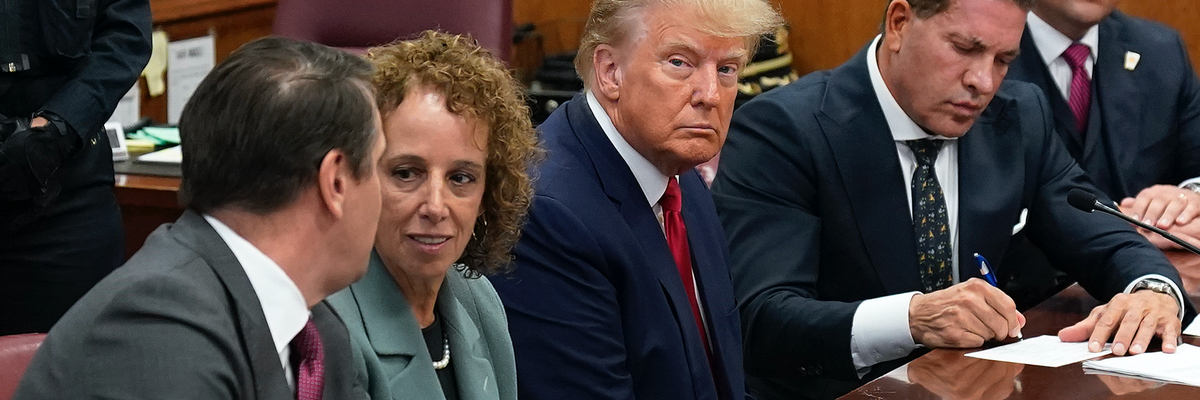Last week, Trump said that if reelected, he’d appoint a “real special prosecutor” to “go after the most corrupt president in the history of the United States of America, Joe Biden, and the entire Biden crime family.”
In other words, if Trump is reelected, you can kiss nonpartisan criminal justice goodbye.
His remark made me think back almost a half century ago, to when I was a rookie lawyer in the Justice Department. The department was in shambles, discredited by Nixon’s and Attorney General John Mitchell’s political abuse and corruption.
To restore trust in the Justice Department, President Gerald Ford appointed Edward Levi to be attorney general. In naming Levi, who had been president of the University of Chicago and the former dean of its law school, Ford found someone whose reputation for integrity was impeccable.
As Levi said at his swearing in, “Nothing can more weaken the quality of life or more imperil the realization of the goals we all hold dear than our failure to make clear by words and deed that our law is not an instrument of partisan purpose.”
Levi set out to insulate the Justice Department from politics, instituting rules limiting White House involvement in law enforcement decisions.
The Senate Watergate Committee chairman, Senator Sam Ervin, didn’t think Levi’s rules went far enough to protect the department from an unscrupulous future president. Ervin wanted to make the Justice Department an independent agency with an attorney general appointed by the president every six years and removable only for neglect.
At the time, I thought Ervin’s proposal too extreme. I assumed America had learned its lesson from Watergate and would never again elect a president as repugnant as Nixon, willing to sacrifice the institutions of government to his own political ambition.
Yet there was some precedent for Ervin’s view. The attorney general was originally viewed as having an independent, semi-judicial role — analogous to that of judges.
Congress established the office of the attorney general in the Judiciary Act of 1789 — the same act that created the federal court system, as distinct from acts establishing executive departments. In the original draft, attorneys general would be appointed by the Supreme Court, not the president. Congress changed this so that attorneys general would be appointed exactly like federal judges.
When George Washington appointed the nation’s first attorney general in 1789, Thomas Jefferson referred to him as “the Attorney General for the Supreme Court.” Early attorneys general shared offices with the court. Their budgets were line items under the federal judiciary, not the executive. Originally, the attorney general was not even in line to succeed to the presidency.
Even after the attorney general became a key part of the executive branch and the Department of Justice was established in 1870, presidents continued to respect the need for prosecutorial independence.
Until Richard Nixon and his scurrilous Attorney General John Mitchell.
But surely, I said to myself at the time, Nixon and Mitchell were the extremes. Edward Levi’s reforms were adequate.
Then came the worst offender of all. During his presidency, Donald Trump viewed the Justice Department as an extension of his own will — even claiming, “I have an absolute right to do what I want to with the Justice Department.”
Trump interfered in the department’s prosecutions of Michael Flynn and Roger Stone, fired FBI Director James Comey for investigating possible collusion between Russia and Trump associates, and demanded that the department reopen a criminal investigation of Hillary Clinton.
John Dean, former White House counsel to Nixon, described Trump’s efforts to use the Justice Department for personal gain as “Nixon on stilts and steroids.”
Now, Trump threatens that if reelected he’ll turn the Justice Department into his own personal vendetta machine. If there weren’t already enough reason to fear a second Trump presidency, this would be it.
Public trust in our governing institutions has already sunk to a new low — due in large part to Trump’s first term, his subsequent Big Lie that the 2020 election was “stolen,” and now his second Big Lie that Biden is orchestrating a “witch hunt” against him.
Even if Biden is reelected, it will be necessary to deal with the damage Trump and his Republican enablers have wrought. Perhaps Sam Ervin’s proposal for an independent Justice Department should be given more serious consideration.

